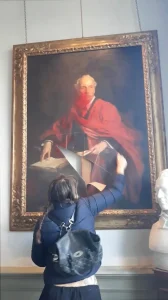(p. C6) There are few sights as alarming as a book set alight. Igniting the printed word in order to destroy the ideas contained therein runs counter to our notions of enlightenment, deliberation and reason. It can also carry a message of contempt for those who consider the burned book sacred. But while there’s no need to condone book burning and plenty of reasons to condemn it, it shouldn’t be punished by law.
That principle is now in jeopardy in Denmark, which has witnessed more than 170 anti-Muslim demonstrations in recent years, including a number of public Quran burnings. In response, lawmakers have introduced a bill to criminalize “improper treatment of objects of significant religious importance.” Offenders would face up to two years in prison. In announcing the proposed law, the Danish government cited the problem of being “seen in large parts of the world as a country that facilitates insulting and denigrating actions against other countries and religions.”
The move marks a reversal from the Danes’ approach in 2005, when the publication of cartoons depicting the Muslim Prophet Muhammad in a Danish newspaper sparked worldwide violence. Then the Danish government stood firm in its defense of free expression, rejecting calls to censor—or even censure—the paper.
. . .
The Danish government insists that its proposal is merely a “targeted intervention,” claiming it will “not change the fact that we must maintain very broad freedom of expression in Denmark.”
. . .
Yet by treating religious sensitivities as inviolate, the measure risks legitimizing the notion that vengeance may be warranted against those perceived to have denigrated the sacred.
. . .
The impulse to outlaw expression that creates unease, offense and uproar is not unique to Denmark. Censors around the world designate speech as dangerous and subversive in order to silence it. Denmark needs to reassure Muslims that it is committed to keeping them safe, protected and respected. It should do that by upholding rather than betraying the country’s core commitment to free expression and human rights.
For the full commentary, see:
(Note: ellipses added.)
(Note: the online version of the commentary has the date September 21, 2023, and has the same title as the print version.)
Nossel’s essay, quoted above, is related to her book:
Nossel, Suzanne. Dare to Speak: Defending Free Speech for All. New York: Dey Street Books, 2020.


